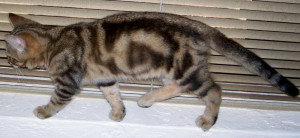When Jake became ill, it happened suddenly. One day he was running and playing with his feline buddy, and the next day he wasn’t himself. It was a beautiful Halloween Day in 2008. No one noticed at first that he didn’t eat his breakfast, because his piggy older “sister” Abby, our most senior cat, gobbled up any leftovers as quickly as she could.
Before I left for work, I noticed that Jake was quiet and seemed listless. I mentioned to Jim that he might be sick. A couple hours later, Jim took Jake to our veterinarian. Our little boy went steadily downhill and had to be euthanized later that day. Jake had contracted a respiratory virus that might have been minor for any other kitty. But unbeknownst to us, Jake had a heart defect. His heart was too small and his little body couldn’t fight the infection.
In Memory of Jake
Cats are very good at hiding illness, and sometimes you just don’t know they are suffering. It is important to know what signs and symptoms could indicate an emergency situation.
- Obvious signs of bleeding. It goes without saying that if an animal is bleeding from any source, treatment should be sought immediately. Even a cut or bit can become septic in a hurry if not treated promptly.
- Sudden personality changes. Sick cats tend to hide. They stop eating; become irritable or perhaps overly talkative. You know your pet. If you see sudden onset changes, seek advice from your veterinarian.
- Litterbox issues. If your cat is spending a lot more time in the box, check to see she is having success each time. An inability to urinate could be a sign of an obstruction or infection and requires immediate help. Diarrhea could be an indication of a serious problem. Repeated bouts of diarrhea should be diagnosed by a professional.
- Any sign of pain. An animal in obvious pain should be examined quickly. Jim noticed Jake panting rapidly, and that is when he rushed him to our vet. Obviously, an injury or paralysis should be check out at once.
- Projectile vomiting. It isn’t unusual for cats to vomit to get rid of hairballs. But repeated, projectile vomiting could signal something serious. Take Fluffy to the vet.
- Seizures or any kind of neurological problem. Just like in humans, a seizure has a cause and only a veterinarian can determine that cause. One of my sons had a barn cat who came up to the back porch where her kittens were housed, and she held her head in a strange manner. It was cocked to one side and slightly tilted, and she appeared unable to move her head from that position. The veterinarian decided Marley had been bitten by a snake, which left a form of paralysis. Always have a professional determine the cause.
 Copyright secured by Digiprove © 2013
Copyright secured by Digiprove © 2013





{ 0 comments… add one now }